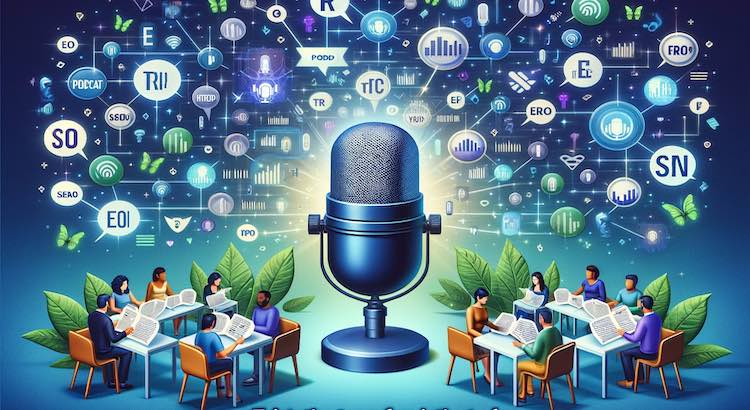Expanding Audience Reach Through Accessibility
Transcription services turn podcast audio into clear, readable text. This process helps more people enjoy podcasts, including those who are deaf or hard of hearing. In the United States, over 48 million people have some degree of hearing loss (Hearing Loss Association of America, 2023).
Transcriptions also benefit:
- Non-native speakers who may find written content easier to follow
- People in noisy places or quiet zones where headphones are not allowed
- Users who find reading faster or more accessible than listening
This accessibility brings new listeners to your show and makes your content useful in more situations. By using transcription services, podcasts become more inclusive, reaching a broader and more diverse audience.
Enhancing SEO and Online Discoverability
Search engines like Google cannot listen to audio files— they rely on text to index and understand content. When you provide transcripts of your podcast episodes, you help search engines "see" your episodes. This makes your podcast more likely to appear in search results and helps new listeners discover your show.
Unlocking New SEO Avenues With Transcripts
Transcripts allow podcasters to include target keywords naturally. This boosts visibility in search results, as your written content matches what people are searching for. According to a 2022 report by SEMrush, websites with rich, keyword-focused content saw up to a 20% increase in organic traffic.
With transcripts, you can also:
- Repurpose audio into blog posts or articles
- Create social media clips from written highlights
- Quote from your podcast for newsletters or press releases
Start improving your podcast's discoverability by ordering accurate podcast transcripts from trusted providers.
Increasing Engagement and User Experience
Giving your audience a transcript offers multiple ways to interact with your podcast. People can:
- Scan text for key points before listening
- Follow along while listening for better understanding
- Search the transcript for specific topics or quotes
Supporting Content Creators and Educators
Transcriptions help content creators, teachers, and students:
- Quickly find shareable and quotable material
- Create study materials based on podcast content
- Use transcripts for research or further writing
The value of a fast, automated transcription service is clear—engaged listeners become loyal fans, and creators get more out of each episode.
Facilitating Content Monetization and Collaboration
Transcriptions do more than expand reach—they also open new paths to revenue. When you have podcast episodes in text, you can:
- Edit and combine transcripts into ebooks or paid reports
- Offer written content to premium subscribers
- Give sponsors a fast way to review and approve content
Monetizing content is easier with clear, well-formatted transcripts. In 2023, podcast ad revenue in the U.S. hit $2.2 billion, a 20% yearly increase (IAB, 2023). Many advertisers look for high-quality content they can review quickly—transcripts help them make faster decisions.
Building Partnerships and Collaborations
Transcriptions also make collaboration smoother. When you have a transcript, it's easier for guest speakers to prepare arguments, and for fellow podcasters to share or remix content. Sharing full text documents builds community and trust among creators and partners.
GoTranscript makes it simple for you to understand transcription pricing and choose a plan that fits your podcast’s needs.
Other Accessibility Tools for Podcasters
Closed Captions and Subtitles
Beyond transcripts, closed caption services and subtitling services help make video podcasts accessible to more people. Captions and subtitles address the needs of deaf or hard-of-hearing viewers, as well as non-native speakers who might struggle with certain accents or fast speech.
Translation and Global Reach
For podcasters with worldwide audiences, services like audio translation and text translation break language barriers. Translated transcripts or subtitles can increase your show's presence in new markets and regions.
How to Get Started With Podcast Transcription
Choose from several options based on your needs and budget:
- AI transcription subscriptions for fast, automated turnarounds
- Manual transcription proofreading services for detailed, human-verified transcripts
- Easy, secure workflows to order podcast transcriptions or order captions online
Review your options and find captioning services pricing that fits your budget and your goals.
Conclusion: Make Your Podcast Shine With GoTranscript
The impact of podcast transcripts is undeniable. They build accessibility for all, strengthen your podcast’s online visibility, and create new opportunities for engagement and revenue. As more creators strive for growth and inclusivity in 2024, reliable transcription services are not just an option—they are the key to long-term success.
GoTranscript offers tailored solutions for every stage of your podcast journey. From standard audio-to-text conversion, AI-powered transcription, to closed captions and more, find everything you need to make your content accessible and discoverable. Start today and unlock your podcast’s full potential with GoTranscript.


 Transcription
Transcription
 Captions (FCC/SDH)
Captions (FCC/SDH)
 Transcript Editing & Proofreading
Transcript Editing & Proofreading
 Translation (text/audio/images)
Translation (text/audio/images)
 Subtitles
Subtitles
 Video Description (AD)
Video Description (AD)









